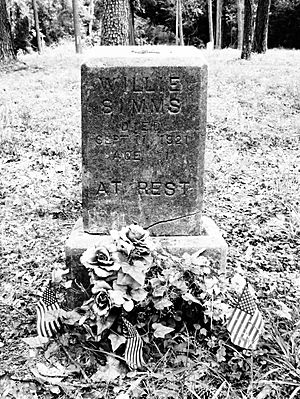Humble Negro Cemetery facts for kids
The Humble Negro Cemetery is a special burial ground located in Harris County, Texas, just north of the city of Humble. It's found about 200 yards north of the FM 1960 by-pass and east of the railroad tracks and U.S. Highway 59. This cemetery holds the history of African American families who lived and worked in the Humble area.
Contents
A Look Back at Humble's History
Changes in Humble City
Humble became an official city in 1933. At that time, the city council voted to make the town "lily white." This meant that only white people were allowed to live inside the city limits. Because of this rule, the black population was forced to move their families and even the graves of their loved ones to new places outside the city.
Starting in 1933, black families began to leave Humble. By 1935, almost all of them had moved out of the city.
Sawmills and New Homes
Before these changes, there was a sawmill north of Humble. It was owned by Mr. Bender, who was one of the people who helped start the town of Humble. Many black workers came from nearby towns like Gladysville, Cleveland, Splendora, and Fostoria to work at this sawmill.
There was also another sawmill west of Humble, owned by Mr. Borders. He was very kind to the African American people who worked for him. He even gave them some land to live on. This area became known as Bordersville, named after Mr. Borders. When African Americans had to move out of Humble, many of them went to live in Bordersville. This community had already been started by the workers from Borders Sawmill.
Bringing the Cemetery Back to Life
Over many years, the Humble Negro Cemetery became overgrown with plants and trees. It was hard to see the graves. In 2005, members of Grace Church, a church in Humble with people from many different backgrounds, wanted to help. They asked the landowners for permission to clean and fix up the cemetery. They had wanted to do this for a long time.
After getting approval from the City of Humble and the Texas Department of Transportation, Grace Church spent a lot of money and effort. They built a road, cleared hundreds of trees, and worked with local historians. Their goal was to bring the cemetery back to its proper state. To honor the war veterans buried there, the church also put up a flagpole with a U.S. flag.
The church is still working to have a special historical marker placed at the site. They hope to return the cemetery to the care of the families whose loved ones are buried there. Grace Church continues to pay for all the maintenance and upkeep of the cemetery.
In 2008, there was an incident where one of the graves was disturbed. This event brought the cemetery to public attention again. The pastors of Grace Church made sure the body was properly re-buried with respect.
The Cemetery Today
Today, the gravesites at the Humble Negro Cemetery are not arranged in neat rows or plots. They are placed randomly. Only a few headstones are still there. Many graves are unmarked, or their stones have been removed over time. Very few records were kept about who was buried there. Sadly, some people have damaged the graves, reducing them to piles of rubble.
 | Misty Copeland |
 | Raven Wilkinson |
 | Debra Austin |
 | Aesha Ash |


